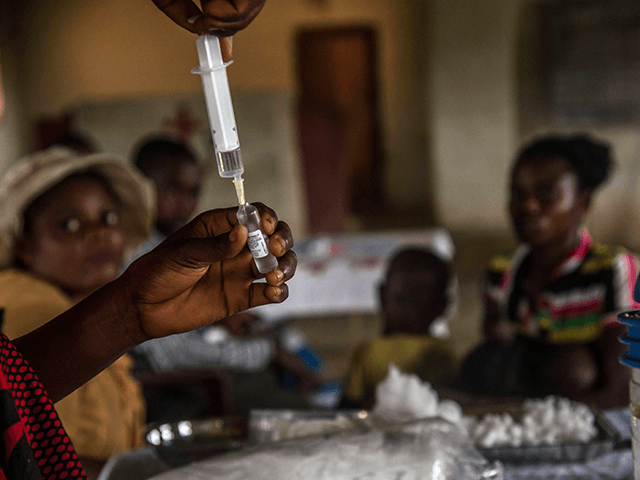Reuters reported on Wednesday that leaked documents from the World Health Organization (W.H.O.) predict a “very high” risk of failure for the organization’s coronavirus vaccination plan for poor countries.
The documents warned that much of the world’s impoverished population might not receive vaccinations until 2024.
The plan in question is called COVAX. Its stated goal is to deliver two billion vaccinations to impoverished residents of 91 countries. COVAX bills itself as “the only truly global solution to this pandemic because it is the only effort to ensure that people in all corners of the world will get access to COVID-19 vaccines once they are available, regardless of their wealth.”
According to Reuters, which did not detail how it obtained the internal documents it quoted, COVAX is severely underfunded, its plans to secure a suitable supply of vaccine are flawed, its estimate of the demand for Chinese coronavirus vaccines was unrealistically low, and its architects have underestimated the difficulty of distributing vaccinations in remote, lawless, and politically turbulent areas:
“The risk of a failure to establish a successful COVAX Facility is very high,” says an internal report to the board of Gavi, an alliance of governments, drug companies, charities and international organizations that arranges global vaccination campaigns. Gavi co-leads COVAX alongside the WHO.
The report and other documents prepared by Gavi are being discussed at Gavi’s board meetings on Dec. 15-17.
The failure of the facility could leave people in poor nations without any access to COVID-19 vaccines until 2024, one of the documents says.
The risk of failure is higher because the scheme was set up so quickly, operating in “uncharted territory”, the report says.
Some of the “risks” referred to by the report are financial, such as the possibility that governments signed up for COVAX could decide to procure vaccines from alternative sources, an option that was evidently not precluded by their supply contracts.
The supply contracts are with companies that do not have products tested and ready to go yet, so one risk is that impatient governments could turn to vaccine solutions currently being rolled out by Pfizer and Moderna – and those vaccinations are at least three times as expensive as the assumptions built into the COVAX plan, in addition to the cost of shipping and storing the Pfizer vaccine in ultra-cold equipment.
The document reviewed by Reuters advised COVAX administrators to either renegotiate those contracts or create some kind of “risk absorption layer” to handle higher costs or lower participation rates. COVAX is already $4.9 billion short of its $7 billion funding goal, and according to the WHO internal document, the true cost of the program will probably soar far beyond that $7 billion estimate, especially if expensive legal battles erupt over contract disputes.
The document even discussed a disaster scenario in which Third World populations develop herd immunity to the coronavirus more quickly than expected and demand for COVAX vaccines becomes too low, visiting financial ruin upon the program when pledged contributions are withdrawn.
“So far Britain and European Union countries are the main donors to COVAX, while the United States and China have made no financial commitments. The World Bank and other multilateral financial institutions are offering cheap loans to poor countries to help them buy and deploy vaccines through COVAX,” Reuters noted.
A good portion of that risk absorption layer could end up being funded by American taxpayers. The Trump administration has been criticized for withdrawing from W.H.O. and declining to finance projects like COVAX; those critics expect the Biden administration will make a point of re-engaging with W.H.O. and funding its projects, especially those related to the Chinese coronavirus pandemic.
China and Russia are also touting vaccine products that could potentially lure pledged governments away from COVAX. A bit of good news for the W.H.O. initiative arrived on Tuesday when Cambodia announced it has decided to wait for vaccines provided by COVAX instead of buying China’s Sinovac shots.
“Cambodia is not a dustbin … and not a place for a vaccine trial,” Prime Minister Hun Sen said on Tuesday when turning down Sinovac despite overtures from several top Chinese officials, including Foreign Minister Wang Yi and Premier Li Keqiang.
Over the weekend, COVAX officially approved Ukraine’s request to obtain eight million doses of vaccine from the program.

COMMENTS
Please let us know if you're having issues with commenting.